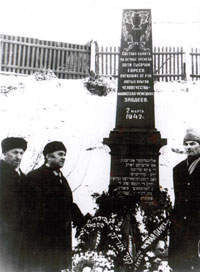Nahum Alshansky was born in 1917 in the town of Shchedrin (a former Jewish agricultural colony near Bobruisk, Belorussia). His father, Mordekhai, was a simple worker; his mother, Dina, was a devout and observant Jew. Nahum was the eldest of five siblings (two brothers and three sisters). Both the parents and the children spoke Yiddish at home, and Nahum attended a Yiddish school in Shchedrin, until it was closed down in the early 1930s. After finishing his schooling, Nahum Alshansky went to Leningrad and enrolled in the Military School of Communications. Shortly before the outbreak of the Soviet-German War on June 22, 1941, Nahum, who had been promoted to lieutenant, was sent to the far south of the Soviet Union. He served in Termez (Uzbekistan) and Kushka (Turkmenistan). His younger brother, Mikhail, had been arrested back in 1939, after the end of Stalin’s Great Purge, and he was still in prison when the war broke out.
Nahum was sent to the front in the autumn of 1941. He saw action in the Volga region, Ukraine, and Austria. Having begun the war as a lieutenant, he ended it as a major and Deputy Chief of Communications of the 74th Division. He was awarded the Order of the Red Banner, two Orders of the Red Star, two Orders of the Patriotic War, and a large number of medals.
After the end of the war, Major Alshansky served in Romania. He married shortly thereafter, and his son Mikhail was born. Eighteen of his relatives, including his parents and three sisters, had been murdered in Shchedrin on March 8, 1942. His brother Mikhail remained imprisoned in a camp near Kandalaksha (Murmansk Oblast), north of the Arctic Circle. He was released and rehabilitated after Stalin’s death in 1953.
In 1948, Major Alshansky was entrusted with the formation of a separate heavy radio relay battalion in the territory of Belarus. The whole family moved there and lived near Minsk. He was quickly promoted to lieutenant colonel. At this time, Alshansky began to communicate with the Jews of Minsk, who were following the first steps of the fledgling State of Israel with great enthusiasm. In 1964, he helped install a monument in memory of the several hundred Jews murdered by the Nazis and their collaborators in his native Shchedrin. Following the Israeli victory in the 1967 Six-Day War, Alshansky's Zionist feelings intensified. With his close friends, Colonel Lev Ovsishcher and Yefim Davidovich, he actively participated in the annual memorial ceremony at the site of the murder of 5,000 Jews from the Minsk Ghetto on March 2, 1942. All three of them were persecuted by the Soviet authorities for their memorialization activities.
In 1970, Alshansky and his family decided to leave the USSR for permanent residence in Israel. They applied for permission to emigrate in 1971, when their daughter had finished high school. In January 1972, their son Mikhail, who was then a 4th-year university student, was expelled from the university, with the official reason for his expulsion being: “We are not training personnel for Israel.” Alshansky himself was demoted to private, deprived of his officer's pension, expelled from the Communist Party, and left without means of livelihood. At the same time, his friends Ovsishcher and Davidovich also applied for permission to emigrate, but all three of them were denied. In 1973, in response to the decision to strip him of his military rank and pension, Nahum Alshansky brought his wartime decorations to Moscow and deposited them at the reception desk of the Presidium of the Supreme Soviet of the USSR. During the four years in which the Alshansky family was classified as "refuseniks", Nahum was repeatedly summoned for interrogation by the KGB, and house searches were carried out.
In 1975, the Alshanskys were finally granted permission to emigrate, being ordered to leave the USSR within three days. In Israel, he worked as the director of an ulpan (a school for teaching Hebrew to new immigrants), but his main passion was the creation of the Union of Veterans of the War against Nazism for immigrants from the USSR, under the aegis of the Union of Veterans of the Wars of Israel. Nahum Alshansky paid much attention to questions of legislation on pensions and benefits for veterans of the war against Nazism. In Israel, he was given the rank of lieutenant colonel in the Israel Defense Forces. Yefim Davidovich was supposed to leave for Israel in 1977, but he died suddenly in Minsk. With a great deal of effort, Alshansky managed to bring the body of his friend to Israel and have him buried with military honors on the Mount of Olives. Lev Ovsishcher received permission to emigrate only in 1987.
Nahum Alshansky died in Israel in 1991.







